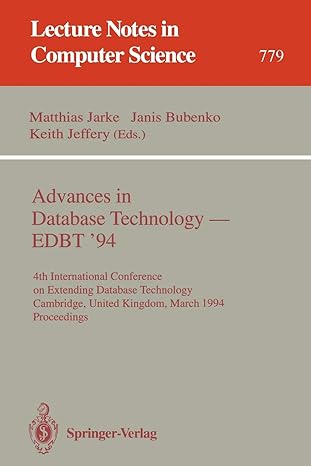Question
Assume that objects a1, a2, and a3 are managed by a server. There are two operations provided by the server for operating the objects. read(a)
Assume that objects a1, a2, and a3 are managed by a server. There are two operations provided by the server for operating the objects.
read(a) returns the value of a
write(a, v) assigns v to a
Assume that the following two concurrent transactions T and U are performed on these objects.
T: read(a2); read(a1); write(a2, a2+85); write(a1, a1-32)
U: read(a2); write(a2, a2-34); read(a3); write(a3, a3-77)
Assume that the original values of a1, a2, and a3 are 124, 156, and 133 respectively.
(a) If the interleaving operations from T and U are serially equivalent to T before U, what are the values of a1, a2 and a3 after the two transactions have completed?
(b) For serial equivalence of T before U, give a possible order of interleaving operations from T and U.
(c) If the interleaving operations from T and U are serially equivalent to U before T, what are the values of a1, a2 and a3 after the two transactions have completed? (d) For serial equivalence of U before T, give a possible order of interleaving operations from T and U.
(e) Give an example of interleaving operations from T and U, which are not serially equivalent and cause the lost update problem.
Step by Step Solution
There are 3 Steps involved in it
Step: 1

Get Instant Access to Expert-Tailored Solutions
See step-by-step solutions with expert insights and AI powered tools for academic success
Step: 2

Step: 3

Ace Your Homework with AI
Get the answers you need in no time with our AI-driven, step-by-step assistance
Get Started


